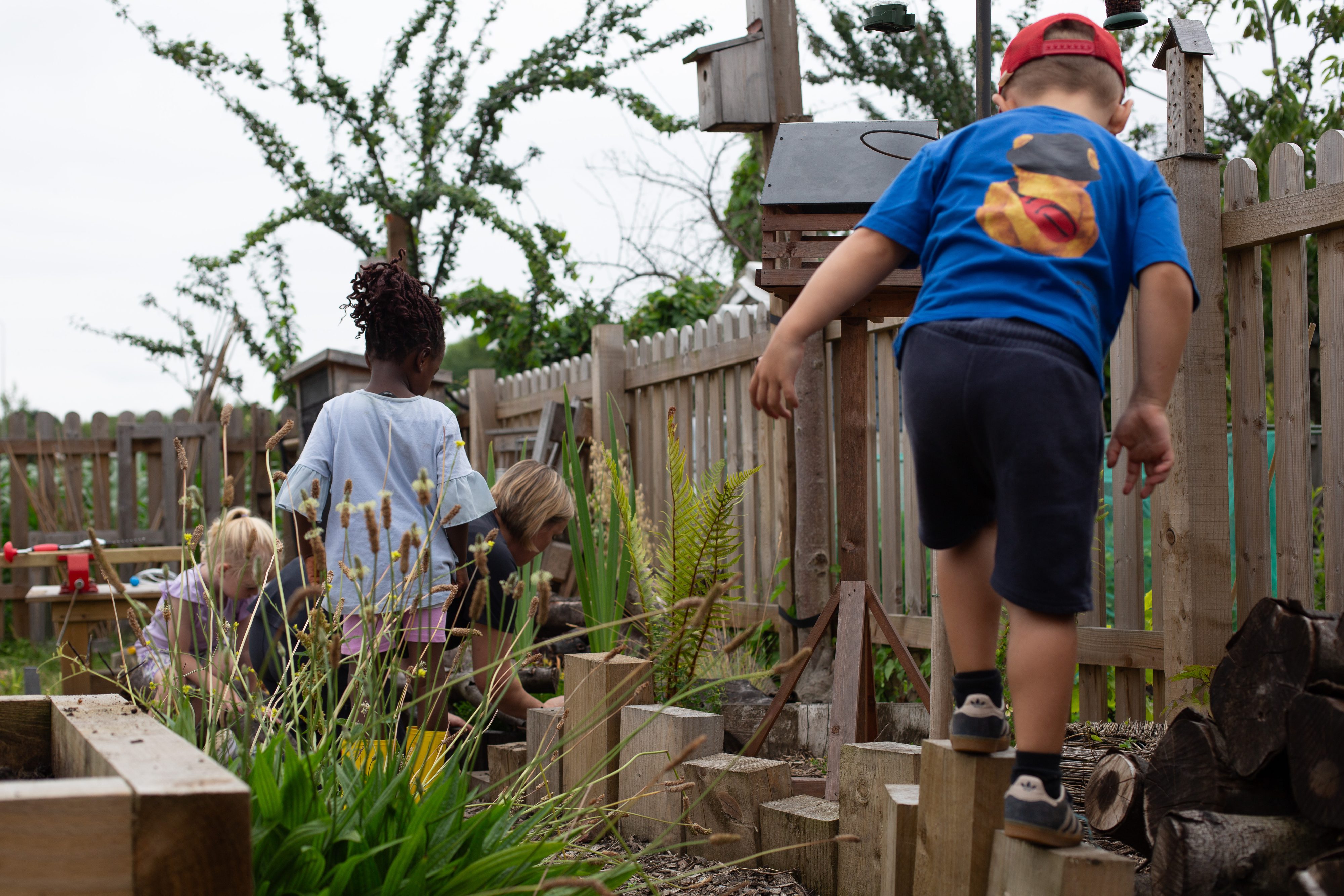Hayley Bullard explores the connections between Forest Schools and a Froebelian approach to early education.
Hayley is a postgraduate researcher at University of Huddersfield. Her doctoral research is focused on the history of the Froebelian kindergarten movement and exploring how this relates to the modern Forest School movement. She created this short article about her experiences as an early years practitioner and her current research during the Froebel Trust's Writing Workshop held in Summer 2022.
-
The Forest School approach and the Froebelian approach differ yet share many similarities. Both value principle-led pedagogy focusing on children’s freedom in learning, play and building connections with nature.
The Forest School approach follows its six principles agreed by the Forest School Association (FSA, n.d) whilst the Froebelian approach enacts its principles of practice. These principles are summarised by the Froebel Trust. However, Forest Schooling is under threat whereas the Froebelian approach continues to strengthen. This article proposes what the Forest School movement can learn from the Froebelian movement.
At the Froebel Trust writing workshop held in summer 2022, Froebelian educators expressed their joy at finding Froebel, finally being able to define their values in early childhood education and seeing an alternative way of supporting the children in their care. I felt the same as I experienced Forest Schooling for the first time.

I was fortunate enough to spend three weeks volunteering in a Swedish Forest Kindergarten. The Swedish children were amazing, so confident in their own abilities and able to take responsibility for their own risky play.
The English Forest School approach is inspired by Scandinavian Forest Kindergartens and is said to promote children’s resilience, connection to nature and confidence in motivating their own learning. Returning to England, I was excited to put this into practice but came across many barriers. My Forest School sessions began to look more and more like gardening, and I was asked by managers who didn’t understand the principles of Forest School, to add more maths into my sessions outdoors. I felt disappointed that the Forest School principles,were becoming diluted. I was not alone in experiencing this.
Recent research indicates that Forest School has become lost in translation with English education agendas influencing practice (Leather, 2018). As a young movement, introduced to England in the early 90’s, the Forest School approach may undergo many shifts as it settles into English education (Knight, 2018). Yet maintaining its principles may prove a challenge. Reflecting on the historical development of Froebel’s kindergartens in England can provide clues as to how Froebel’s principles have stood the test of time. This can aid the development of the Forest School approach and prevent its principles being forgotten.
The Froebelian movement had its own challenges as it developed in England. In the late-1800s, during the industrial revolution, Froebelian Kindergarten methods were beginning to increase in interest with its inclusion in some elementary schools (Lilley, 1967). Early Froebelians began to promote a rigid use of Froebel’s methods, developing children’s manual skills, to satisfy their governments' outcome-driven agendas towards mass education and industrialisation (Read, 2003; Nawrozki, 2006). An instrumental perspective of play developed, where play becomes a tool for the adult to use to manipulate certain outcomes. Not what Froebel had in mind when he said:
‘To young plants and animals we give space and time, knowing that then they will grow correctly according to inherent law… But the human being is regarded as a piece of wax or a lump of clay which can be moulded into any shape we choose. Why is it that we close our minds to the lessons which Nature silently teaches?’ (Froebel in Lilley, 1967, p.52)
Many Froebelians became critical of the rigid and disconnected use of Froebel’s methods and, as the country moved on from industrialisation, these instrumental perspectives become outdated and damaging to the Froebel image. By the early 1900s, Revisionist Froebelians distanced themselves from the Early Froebelians and began to revise and strengthen Froebel’s original principles of his philosophy (Lilley, 1967; Nawrozki, 2006). Putting Froebel’s principles before methods, the Revisionists were able to pave the way for modern Froebelian practice. Even today, Froebelian Professor Tina Bruce still advocates a ‘reconnection of Froebel’s principles’ and a reconnection to Froebel (Bruce, 2021, p.1). Importance is placed on the whole Froebelian framework, including valuing the importance of play, autonomous learners and engaging with nature.
Like the Early Froebelians, Forest School has promoted the benefits, at the cost of its principles, to increase its uptake in mainstream education. As the approach aligns with mainstream education, it has become subject to pressures within the education system. Forest School practitioners feel pressure to create more structured sessions, planning and tracking children’s progress, to justify the use of the approach (McCree, 2019; Whincup et al., 2021). There is an over emphasis on the adult’s role as the facilitator (Sharma-Brymer et al., 2018), creating an instrumental perspective of play in Forest School as play becomes the instrument for developing desirable learning outcomes.
The Revisionist Froebelians were successful in separating themselves from the restrictive Early Froebelian methods. They achieved this by developing critical perspectives of methods and refocusing the approach back to Froebel’s principles. A critical perspective is growing in Forest School literature and amongst Forest School practitioners. Tokenistic practices, ensuring alignment with mainstream education agendas, still pose a threat to progression of the approach. Revisionists reinstated the Froebelian identity by going back to the original principles. Ensuring principles come before methods and outcomes is a lesson the Forest School movement can take from the history of Froebelian education. So, this article hopes to spark a search for the Revisionist Forest Schoolers.

References
Bruce, T. (2021). Friedrich Froebel: A Critical Introduction to Key Themes and Debates. London: Bloomsbury Publishing Plc
FSA [Forest School Association]. (n.d). Full principles and criteria for good practice.
Knight, S. (2018). Translating Forest School: A response to Leather. Journal of Outdoor Environmental Education, 21,19-23.
Leather, M. (2018). A critique of “Forest School” or something lost in translation. Journal of Outdoor and Environmental Education, 21,5-18.
Lilley, I. M. (1967). Friedrich Froebel: A selection from his writings. London: Cambridge University Press
McCree, M. (2019). When Forest School isn’t Forest School. In Sackville-Ford, M. and Davenport, H. (Eds.). Critical Issues in Forest Schools. (pp.3-20). SAGE Publications
Nawrotzki, K.D. (2006). Froebel is Dead; Long Live Froebel! The National Froebel Foundation and English Education. History of Education, 35 (2) 209-223. doi: 10.1080/00467600500528503
Sharma-Brymer, V. Brymer, E., Gray, T. and Davids, K. (2018). Affordances guiding Forest School practice: the application of the ecological dynamics approach. Journal of Outdoor and Environment Education. 21, 103-115.
Whincup, V. A., Allin, L. J. and Greer, J. M. H. (2021). Challenges and pedagogical conflicts for teacher-Forest School leaders implementing Forest School with the UK primary curriculum. Education 3-13.


